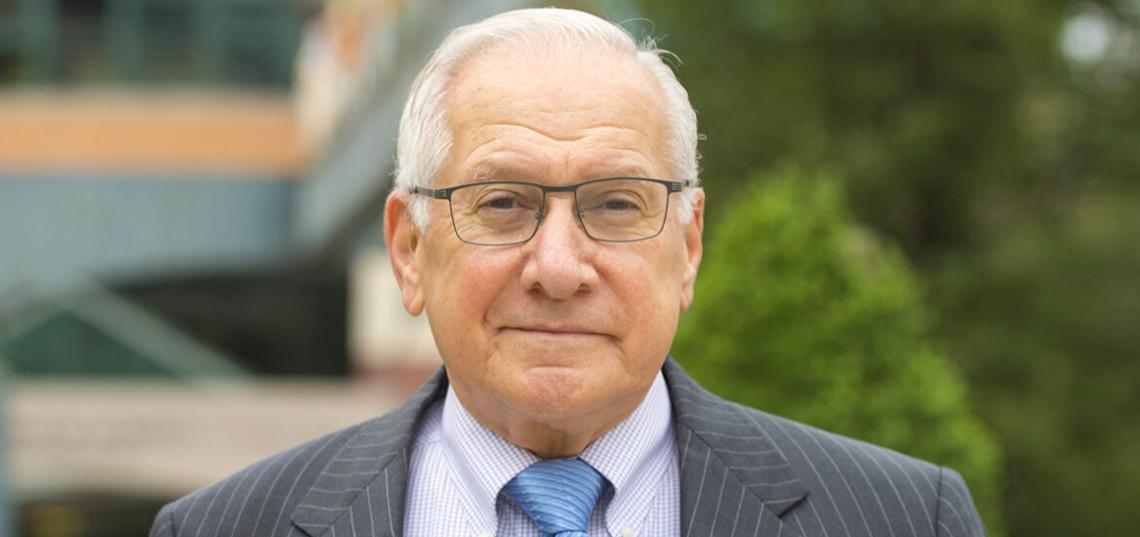
By Scott Fogdall, Rutgers University Foundation
Telehealth pioneer James Tuchi has generously committed $8 million in support of major initiatives at Rutgers Biomedical and Health Sciences and the Rutgers School of Communication and Information. The gift will propel advances in biohazard management, medical device development, post-trauma care, and crisis communication. It also will help develop avenues for healthcare-related mentoring, information sharing, and clinical trial incubation.
As president, CEO, and founder of Millennium Healthcare Solutions, Tuchi was an early innovator in the burgeoning field of online medical care, and his involvement in the pharmaceutical and life science industries continues at Global Health Sciences, Inc., which he also founded.
Tuchi and his wife, Sari, are New Brunswick residents and both have received life-saving treatments from experts at Rutgers Robert Wood Johnson Medical School. Gratitude for those experiences, and enthusiasm about the medical-science innovations occurring at the university, are the genesis of Tuchi’s recent philanthropy.
Undergoing quadruple bypass surgery in 1994, Tuchi was and continues to be under the care of cardiologist Clifton R. Lacy, the former New Jersey health commissioner and former chief of cardiology at Rutgers Robert Wood Johnson Medical School. Lacy, now a distinguished professor at the School of Communication and Information, introduced Tuchi to Jeffrey Carson, who became Tuchi’s primary care physician.
Tuchi took an interest in the research activities of both doctors and resolved to champion their work whenever possible. “If not for them and the people at Robert Wood Johnson, I wouldn’t be in the shape I’m in,” Tuchi said.
One of Tuchi’s philanthropic goals was to find, in his words, “programs that could be immediately beneficial if they had funding.” RBHS Chancellor Brian Strom agreed that the influence of these initiatives will be almost immediate, noting further that “they’ll also have impact for many, many years.”
Tuchi’s gift includes $3 million to drive advances in the management of mass exposure to anthrax; develop a portable device that detects lead in water and blood; improve bleeding control after traumatic injuries; and train leaders in effective risk and crisis communication. These efforts are led by Lacy, who lauded “the acceleration of discovery, innovation, and development right here at Rutgers” and said that Tuchi’s generosity will have “a multiplier effect for a long time to come.”
Another $3 million will launch a clinical trial incubator headed by Carson, provost of RBHS and the Richard C. Reynolds M.D. Chair in General Internal Medicine. The incubator will guide and train faculty seeking to redirect their careers into medical research, giving professionals “the tools necessary to succeed, build the capacity of faculty to initiate high-impact research, and bring important research projects to the university,” Carson said.
Finally, $2 million will support Project ECHO, a guided-practice, tele-mentoring model, comprising telehealth clinics in which practitioners across a variety of disciplines exchange information and insight. “ECHO allows participants to share best practices,” said Kathy Dodsworth-Rugani, the project’s executive director. “It is an all-teach, all-learn model to enable better access to health care for all.”
Chancellor Strom praised Tuchi for empowering advances “on many different levels.” Strom said the benefits will be visible “in terms of providing care to patients who otherwise wouldn’t get it, and to future generations and new discoveries going forward.”
This article was originally posted by the Rutgers University Foundation on November 12, 2020. To view the original story, click here.
Photo credit: Nick Romanenko
